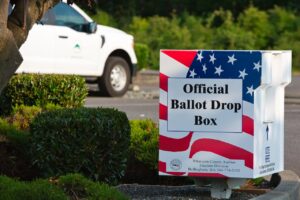The resignation of a sitting president is a rare event that can have far-reaching implications for the political environment, the conduct of government business, and the electoral process. When such a resignation happens after early voting has already commenced, the consequences and complexities multiply. This article will take a look at the constitutional, legal, and practical consequences of a president resigning during early voting. We will examine the potential impacts on political parties, voters, and the democratic process.
Constitutional and Legal Framework
The 25th Amendment and Presidential Succession
The United States Constitution, specifically the 25th Amendment, explains in detail the procedures for presidential succession. Should a president resign, the vice president would then immediately assume the presidency. This amendment, ratified in 1967, was created to ensure continuity in the executive branch and to deal with any confusion surrounding presidential incapacity and succession.
During an ongoing election, such a transition is straightforward enough at the federal level. The vice president will become the president and serve out the remainder of the term. However, the timing of such a resignation, especially during the process of early voting, creates difficulties for the electoral process.
Early Voting and Election Mechanics

The Dynamics of Early Voting
Like it or not, early voting has now become a fundamental part of the electoral process in the United States, allowing voters to cast ballots prior to Election Day. This period can begin weeks before the actual election date, and millions of Americans now take part in early voting. The idea is to provide greater accessibility and convenience. An added benefit is the reduction of long lines on Election Day. All this tends to ensure higher voter turnout, particularly on days when weather is a factor.
If a president resigns during this period, the ballots already cast pose quite a challenge. These votes were made under the assumption of the current candidates. Any sudden change can lead to confusion and potential feeling of general disenfranchisement among voters.
Design and Replacement of Ballots
Once early voting has started, ballots have been printed and distributed, to mail-in voters and those opting to use early voting locations. If a presidential candidate withdraws or resigns, the ballots cannot be easily reprinted or redistributed without causing major delays and logistical nightmares.
In many states, election laws require that if a candidate dies or withdraws after the ballots have been printed, the election goes forward with the candidate’s name still on the ballot. In the case of a resignation, voters may continue to cast ballots for a candidate even though he or she is no longer in the race. This scenario can lead to a “placeholder” scenario. The votes cast for the resigned candidate effectively become votes for a designated successor who will be chosen by the party.
Political Party Responses
The Nomination of a Replacement Candidate
When a presidential candidate resigns, his or her political party must quickly respond to the vacancy. The party’s national committee would typically convene to choose a replacement candidate. This process will be guided by party rules and the urgent need to present a new candidate to the electorate.
As an example, if the sitting president is the candidate for re-election and resigns, the vice president, who will have assumed the presidency, may be nominated as the party’s candidate. Or, the party may choose another prominent figure. This decision is critical and must be made quickly to maintain electoral competitiveness and confidence of the electorate.
Perception and Impact
The resignation of a presidential candidate can significantly influence voter perception and behavior. Those who have already cast their ballots for the resigned candidate may feel abandoned or confused. The party’s ability to effectively communicate the changes and the new candidate’s platform becomes critical in keeping voter disillusionment to a minimum.
As you might expect, the opposing party may leverage the situation to their advantage, drawing attention to the instability and appealing to voters to reconsider their choices. This can shift the momentum of the entire election, influencing undecided voters and potentially altering the outcome of elections at all levels, federal, state, and local.
Legal Challenges and Litigation
The resignation of a presidential candidate during early voting will almost certainly bring on legal challenges. Other candidates, parties, and even voters may file lawsuits to address the legitimacy of the election, how the early votes are to be handled, and the measures to be taken for determining who the replacement candidate will be. The courts will be tasked with the interpretation of state and federal election laws. The fairness of the process will require assessment, and appropriate resolutions put into action.
Along with the legal battles will come uncertainty and delays in the confirmation of election results. The court’s role in resolving these disputes is crucial. Timely and clear decisions are vital to uphold the integrity of the election and inspire voter confidence.
Practical and Logistical Issues
Election administrators must communicate with the electorate, providing clear guidance on how the resignation will impact their votes and just exactly what is being done to deal with the situation. Transparent communication—something that we are frequently promised by candidates—is necessary to maintain trust in the electoral process.
Historical Examples
To date, no U.S. president has resigned during early voting, but there are instances throughout history of candidates withdrawing or passing away close to Election Day. One notable example is the 1872 presidential election. Liberal Republican candidate Horace Greeley died following the election but before the Electoral College’s votes were cast. The electors pledged to Greeley were required to reallocate their votes, highlighting the complexities that can come up in such scenarios.
Valuable Lessons Learned
Such precedents provide us valuable lessons for dealing with a presidential resignation during early voting. They emphasize the importance of a clear legal framework and prompt decision-making by the political parties, as well as effective communication with the electorate.
The Role of the Vice President
Assuming the Role of President
When the president resigns, the vice president then assumes the role of president. This transition is immediate and mandated by the Constitution for the sake of ensuring continuity in the executive branch. The new president’s achievements and displayed judgment during this period of time can impact voter perception and the overall political landscape.
Dynamics of a Campaign
If the vice president becomes the presidential candidate in the aftermath of a resignation, the dynamics of the campaign change drastically. The replacement candidate must move quickly to establish their platform while addressing the circumstances of the resignation, and reassuring voters of their qualifications as a leader … a daunting task, considering the limited amount of time remaining.
Voter Impact and Democratic Principles
Preventing Voter Disenfranchisement
One of the major concerns in this particular scenario is voter disenfranchisement. Voters who cast their ballots early for their candidate of choice who then resigns may feel as if their votes no longer matter. This perception can undercut confidence in the electoral process and ultimately discourage voter participation in future elections.
Maintaining Democratic Principles
In order to uphold democratic principles, it is important to make certain every vote is counted, and the electoral process remains fair and transparent. This is a major issue with many voters in our current political environment. It is not hard to find someone who believes the last couple of elections were at the very least controversial.
Election officials, political parties, and the judiciary must put aside differences and work together to rise up to the challenges brought forth by any and all elections. More so in the event of a mid-election resignation and to defend the integrity of the election. Too many good men and women have sacrificed life and limb throughout our nation’s history for us to not protect the integrity of our elections.
Conclusion
The resignation of a president during early voting is unprecedented and complicated occurrence accompanied by far-reaching consequences. Such an event would no doubt test the strength of the framework of our constitution, the flexibility of the political parties, and the ability of election officials to manage such extraordinary circumstances.
I’m writing this in July of 2024. The way this year’s election is shaping up, it promises to be entertaining at the very least, and the scenarios discussed in this article have at least a possibility of coming to pass. If you enjoy drama, this election should capture and maintain your attention. There are dozens of scenarios how the 2024 election can play out, and hundreds if not thousands of consequences for each of those scenarios. My hope is that our country and our freedom will survive, and that someday soon we can get back to treating one another as fellow Americans, who vote for candidates whose personalities and motivations are in question.
All said and done, the power of a democracy rests in its ability to support the principles of fair representation and the rule of law, even during—especially during—the challenges of unexpected events. A presidential resignation during early voting would be an extreme test of such principles, requiring thoughtful consideration while under pressure, prompt action, and a commitment to the democratic process.

Thanks Wayne. Very informative.